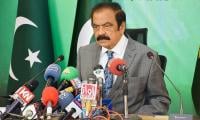ISLAMABAD: Chief Justice Umar Ata Bandial remarked on Friday that there was no martial law-like situation in the country, and if such a situation arises, the apex court would intervene.
Being head of a six-member larger bench of the apex court, he was hearing identical petitions, challenging the trial of civilians in the military courts under the Army Act 1952. Other members of the bench include Justice Ijazul Ahsan, Justice Munib Akhtar, Justice Yahya Afridi, Justice Sayyed Mazahar Ali Akbar Naqvi and Justice Ayesha A. Malik.
Former prime minister and Chairman Pakistan Tehreek-e-Insaf (PTI) Imran Khan, Barrister Aitzaz Ahsan, former chief justice Jawwad S Khawaja, and the Supreme Court Bar Association (SCBA) have challenged the trial of civilians in the military courts.
Latif Khosa, counsel for Aitzaz Ahsan, told the court that at present, whatever was happening in the country, was akin to what had taken place during General Ziaul Haq era.
However, the CJ told Khosa that he could not compare the present era with the regime of Ziaul Haq. “There is no situation like martial law and if such a situation arises, we will intervene,” the CJ added.
Earlier, the federal government told the Supreme Court the trial of suspects of May 9 attacks would be conducted in an open court and the family members of the accused as well as their counsel would witness the proceedings.
Also, the accused would be given a chance to hire their private counsel for pleading their cases in the military courts.
The government, however, sought time for consideration of the right to appeal for the accused after their conviction by the military courts for the offences.
In pursuance of the court’s last order, Attorney General Mansoor Usman Awan, after giving extensive arguments in the case, informed the court that the government wanted to deliberate thoroughly for consideration of right to appeal to the accused, to be tried in military courts for their alleged involvement in attacks on sensitive military installations on May 9 and thereafter.
On the last hearing, held on July 19, the court had sought assurance from the federal government that the suspects allegedly involved in May 9 incidents would be proceeded against with fair trial besides giving them right to appeal against their conviction by the military courts.
The court had directed the attorney general to seek instructions from the government on the matter.
The AG submitted that the government wanted to ponder on this aspect, hence it needed careful consideration while referring to the case of Indian spy Kulbhushan Jadhav.
The AG submitted that the government wanted to deal with the matter in a manner so that the country’s position is not affected. “Therefore, we need some time for consideration of the issue,” the AG submitted.
“We are satisfied that you are cooperating with the court and the government is inclined for the consideration of this aspect,” CJ Bandial told AG.
“How much time you need,” the CJP asked the AG. “One month,” the AG replied.
The CJ, however, made it clear to the AG that he would have to ensure that till the decision of the court, no trial of civilians should commence, adding that it must be ensured that the accused persons should be allowed to meet their relatives besides ensuring the accused all the facilities including access to their counsel.
“Even after the expiry of the present government, if anyone violates the court order, the relevant authorities will be summoned and their reply would be sought,” the CJ told AG.
The AG assured the court that the cases of the accused were at the investigation stage, no trial of the civilians would commence, adding that the court would be properly intimated before commencement of the trial.
During the course of hearing, Latif Khosa expressed reservations over what he termed the miserable condition of the accused in custody. He told the court according to his knowledge, one of the accused persons was produced before a magistrate for recording his statement in such a miserable condition due to which the magistrate refused to record his statement.
The CJ told the AG that it must be ensured that the whole process of trial must be fair, followed by legal requirements.
Latif Khosa questioned as to who prevented the government from making legislation on the right of appeal to the accused persons or other related matters. “We also want fair trial and due process of law with particular reference to enforcement of Article 175 of the Constitution,” Khosa submitted.
“Is it possible that a group of lawyers may visit the place where the accused persons are being kept,” the CJ asked the AG. The AG, however, replied that only family members of the accused could be allowed to meet.
“Even we can appoint a retired judge for meeting the accused,” the CJP again told AG.
The AG submitted that he could inform the chief justice in his chamber in this regard.
The CJ said the court wanted that the accused under custody should be given basic rights, and they should be allowed to meet their relatives.
The AG also replied to a question, put by the court on the last date of hearing regarding detailed reason for the cases, to be decided by the military courts.
The AG submitted that the military courts, after concluding the trial of every individual and conviction, would also ensure giving detailed reasons for its judgments on the cases of the accused.
Justice Ijazul Ahsan observed that 21st constitutional amendment was made for the application of Army Act on civilians and had set some conditions as well.
The judge further observed that for the establishment of military courts, 21st constitutional was made but for specific time period.
Justice Yahya Afridi, at one point, asked the AG as to whether the Army Act was out from the ambit of basic fundamental rights?
The AG replied in affirmative, adding that fundamental rights did not apply to the Army Act.
Elaborating his arguments on the May 9 incidents, the AG submitted that the video clips he had submitted before the court showed that a lot of people were involved in the events of May 9. “But only 102 people were finalised for their court martial with much caution,” the AG submitted, adding that such kind of incidents had happened for the first time in the country’s history. That’s why the government wanted to prevent such type of incidents in future.
Justice Mazahir Ali Akbar Naqvi asked the AG as to how it was decided who would be tried in military courts and who would not. The AG replied that under Section 2(1)(d) of the Army Act the accused would be tried in the military courts.
The attorney general also gave an overview of the process for the trial, saying that at the first stage, report of all the accused would be prepared, followed by the second stage on initial investigation under Rule 175 of the Army Act.
The next stage was related to the custody of the accused under Section 73 of the Pakistan Army Act, followed by investigation of charges and summary of evidence and framing of charges, the AG submitted.
He further submitted that the next stage was application of Rule 19 whereby the accused was charge-sheeted.
At this, Justice Yahya Afridi interrupted and told the AG that before Rule 19, there was Rule 13 wherein the commanding officer decided as to whether the case was made out or not.
The AG replied in affirmative. The chief justice said they would deliberate among each other and inform about the next date of hearing in the matter and adjourned the hearing for date-in-office (an indefinite period of time).The case of trial of civilians in military courts will be heard on August 1, 2023.
Legislation ordering social media firms to take “reasonable steps” to prevent teens from having accounts
Chairing meeting on “Zero Waste Mission” CM announced door-to-door waste collection campaign
Research is set to explore strategies for sustainable economic growth and boosting foreign investment
Brent crude settled 2 cents higher at $72.83 barrel while US West Texas Intermediate crude slipped 5 cents to $68.72
ED has increased number of nominations for MCMC, mandatory training course for promotion to BS 19







